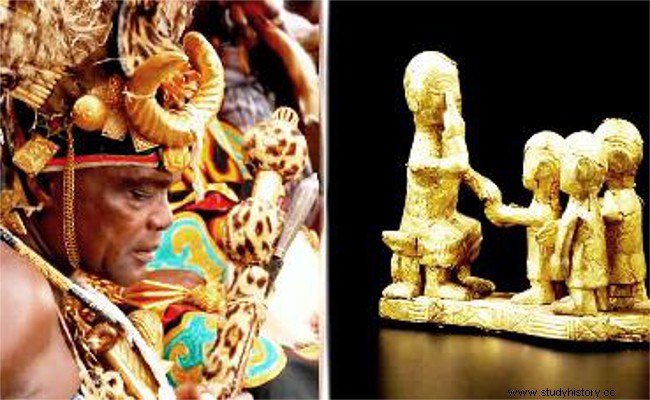
Ghana was one of the largest empires formed on the African continent that developed outside the coastal regions or Muslim Africa. Its area corresponded to the current regions of Mali and Mauritania, bordering the immense Sahara desert. From now on, we can see the exciting story of a kingdom that prospered even though it had no outlets to the sea and was close to a region considered economically unviable.
The explicit geographic difficulties of the region began to be overcome when the populations of Sub-Saharan Africa (or Black Africa) came into contact with the northern portion of the continent. Thanks to the domestication of the camel, it was possible for pastoral communities near the Sahara Desert to start undertaking new economic activities. In times of drought, Berber shepherds moved to the Sahel region to trade with the peoples of the region.
Among these populations, the Soniquês stood out, occupying a region close to the banks of the Senegal and Niger rivers. These people began to organize themselves into stable farming communities that came together mainly because of the attacks of nomadic tribes. The region that was rich in gold combined its agricultural production with trade in the region to undertake the formation of the Kingdom of Ghana. In this way, a monarchy was established in the interior of Africa.
Its political organization is a matter of controversy among historians who study the subject. Despite having a large territory and a political organization typical of imperial governments, Ghana did not have a militarized or expansionist culture. The State was maintained through an efficient tax collection system located in the main trading posts in a not very well defined territory.
Ghana's commercial economy reached its peak in the 8th century, linking the regions of North Africa, Egypt and Sudan. Among the main products traded were salt, cloth, horses, dates, slaves and gold. These last two items were of fundamental importance for the economic expansion of the kingdom of Ghana and the considerable increase in the available workforce. Among the most important urban-commercial centers of this period, we highlight the city of Bambuque.
Gold was shipped mainly to the Mediterranean Sea region, where the Arabs used it to mint coins. To control the gold mining regions, the king was directly responsible for productive control. To protect the gold region, the use of legends about fantastic creatures was used to ward off the greed of other peoples. Salt was also of great value due to its importance for food preservation and fluid retention for people who wandered in the desert.
The kingdom of Ghana began to feel the first signs of its crisis with the depletion of the gold mines that supported its economy. Furthermore, after the 8th century, Islamic expansion threatened the centralized structure of government. The so-called Almoravids would have undertaken the conflicts that, in the name of Allah, disrupted the Kingdom of Ghana. From then on, the kingdoms of Mali, Sosso and Songhai would dispute the region.
